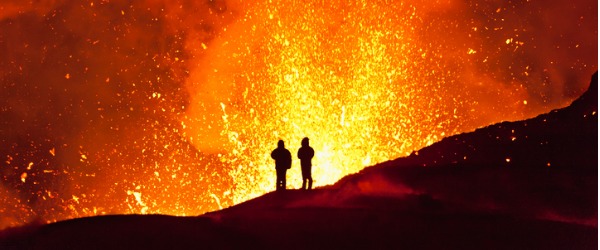What is a Volcanologist?
A volcanologist is a highly educated specialist in geophysics who studies active and inactive volcanoes. Active volcanoes are studied to understand the movement and formation of molten rock (or magma) deep under the earth's surface. Inactive volcanoes have rock formations that were created by eruptions tens of thousands of years ago, and are a great source of information and detective work for volcanologists.
This career is not a 'typical' career, in that the job tasks can vary a great deal. There will be days when volcanologists will watch volcanoes erupt, days when they'll be doing paperwork at the office, days when they'll be flying in a helicopter and installing instruments, and days when they'll be attending scientific conferences.
What does a Volcanologist do?

The goal of a volcanologist is to understand how and why volcanoes erupt, how to predict future eruptions, their impacts on the history of our earth, and how they may affect humans and their environment. Most of a volcanologists’ work is done by either studying dead or dormant volcanoes, or by keeping track of active or reawakening volcanoes. They will then publish or present their findings in an easy to understand way for the general public.
There are four major groups of study and types of volcanologists:
Physical volcanologists
- study and gather data of the actual processes and deposits of volcanic eruptions, giving volcanologists information about where and how volcanoes are likely to erupt
Geophysicists
- mainly deal with volcanic seismicity, gravity and magnetics, and can either spend most of their time outdoors studying various features of the earth, or indoors using computers for calculations and modeling
Geodesic Volcanologists
- look at how explosions and lava flow change or deform the shape of the earth and produce new and different earth formations. Much time is spent doing research, taking measurements, and collecting samples from dead or dormant volcanoes.
Geochemists
- deal with the structure, composition, and processes that make up the earth, as well as volcanic products, such as emitted gases and the distribution of chemical elements in rocks and minerals. They also study the movement of these elements into our soil and water systems.
What is the workplace of a Volcanologist like?
Volcanologists are employed by government agencies, universities and private industry. Work can take volcanologists hiking through mountains in all kinds of weather and going to the mouth of volcanoes to collect samples. They also spend a lot of time collecting and analyzing samples of debris, rocks and other products from extinct volcanoes. There is also lab and office work to be done; looking through microscopes, and analyzing mineral elements from rock formations.
Volcanologists are also known as:
Igneous Petrologist